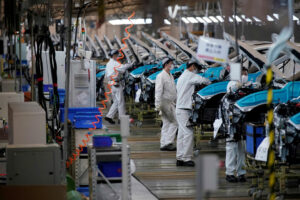THE PHILIPPINES is lagging its neighbors in taking in investors seeking to diversify their supply chains, Nomura Global Markets Research said.
“Indonesia and the Philippines have been laggards in terms of benefiting from supply chain diversification, despite being among the fastest growing economies in the region with favorable demographics and strong reform prospects,” it said in a report.
“This likely reflects in part their starting positions: both countries have weak forward and backward linkages to regional supply chains, as discussed above, and smaller manufacturing bases with the share of manufacturing output to total gross domestic product (GDP) declining,” Nomura Global added.
It also cited industries in which the Philippines is unable to maximize supply chain diversification, such as electronics.
“In electronics, which has been a primary sector where supply chain relocations are taking hold in other ASEAN countries, the Philippines has not been able to benefit significantly, despite its electronics exports accounting for nearly 60% of the country’s total exports,” Nomura Global said.
Electronic products account for 58.6% of Philippine manufactured goods and more than half of total exports. Exports were up 0.8% at $3.59 billion in March.
In the first quarter, electronics exports amounted to $10.47 billion, up 13.43%.
“The sector also remains concentrated in basic operations such as assembly, testing and packaging semiconductors, requiring high import content. The electronics trade surplus, as a result, remained relatively stagnant over the last several years.”
Semiconductor exports rose 15.3% to $8.14 billion in the first quarter.
“In our view, this is symptomatic of a broader set of issues in the manufacturing sector, which is still small as mentioned before and even declining in its share of total output,” Nomura Global said.
“In particular, power rates remain the highest in the region and connectivity is relatively poor after decades of underspending in infrastructure, keeping transport and logistics costs high,” it added.
It noted that while the government has made efforts to attract more investment and implement reforms, this may “take time to reap benefits.”
“Officials have also mentioned a ‘catch-up plan’ to support the semiconductor sector to increase value-add, as well as the mining and mineral processing sector in a bid to replicate Indonesia’s success in nickel processing and create linkages with the EV battery ecosystem,” it said.
“However, uncertainty from the mining fiscal regime, in which legislation aiming to clarify revenue-sharing and taxation is still pending deliberations in Congress. The uncertainty could therefore stall progress in nickel mining,” it added.
The report noted that the Philippines is among the major producers of nickel and has “vast” nickel resources.
“Finally, recent geopolitical concerns from the dispute in the South China Sea could be an impediment to Chinese companies looking to diversify supply chains into the Philippines,” it added. — Luisa Maria Jacinta C. Jocson
